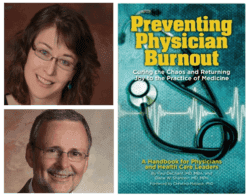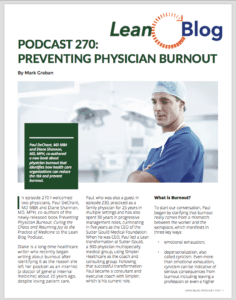
My guests for Episode #270 of the podcast are two physicians: Paul DeChant, MD, MBA and Diane Shannon, MD, MPH. They are co-authors of the recently-released book Preventing Physician Burnout: Curing the Chaos and Returning Joy to the Practice of Medicine. Paul was previously a guest for Episode #230.
In this episode, we'll discuss the causes of physician burnout, not to mention other medical professionals. We'll also talk about ways of preventing or even undoing burnout and how Lean (or at least “Lean done right”) can serve as a powerful countermeasure and preventive approach, as well.
Streaming Player (Run Time 43:49)


For a link to this episode, refer people to www.leanblog.org/270.
Topics and Links for this Episode:
- Find Paul on Twitter: @PaulDeChantMD
- Fine Diane on Twitter: @DianeWShannon
- Paul's website, bio, and blog
- Diane's website, bio, and blog
- Buy the book via Amazon (Kindle version coming soon)
- Diane's article on why she stopped practicing medicine
- What led to the writing of the book?
- What is “burnout?”
- What are possible causes of burnout?
- Is it possible to “undo” burnout?
- How is Lean a part of this equation for preventing burnout?
- How does L.A.M.E. get in the way? How widespread of a problem is this?
- How do you respond to people, including doctors, who think Lean is about speeding up the work, causing more stress, and not being able to care for patients as well?
- I've read some skeptical physicians who seem to pooh-pooh the idea of burnout and that people need to be tougher or that we need to teach resilience? What are your thoughts on this?
- What's one thing any health system or hospital CEO should do tomorrow to reduce and prevent burnout?
For earlier episodes of my podcast, visit the main Podcast page, which includes information on how to subscribe via RSS, through Android apps, or via Apple Podcasts. You can also subscribe and listen via Stitcher.
Thanks for listening!
Podcast Summary
You can also read and download this PDF summary of the podcast:

Previous Episode with Dr. Paul DeChant
Excerpt From the Book:
I was happy to endorse the book and was also quoted in the book after being interviewed by the authors about my experience as a non-physician trying to help others in healthcare. A few short excerpts:
According to Mark Graban, Lean consultant and vice president of improvement and innovation services for the software company KaiNexus, many of the physicians in the organizations he is asked to help feel the loss of autonomy very acutely. “Autonomy at work is an important expectation for health care professionals that is not present to the same degree in the manufacturing settings where Lean was developed. What is the same is the sense that workers in traditionally managed manufacturing and health care settings feel they cannot make a difference in the workplace.”
…
In this chapter we'll delve into the key differences between Lean Done Right and, as Mark Graban, Lean consultant and vice president of improvement and innovation services for the software company KaiNexus, has called it, Lean As Misguidedly Executed, or “L.A.M.E.”
… Lean leadership style also requires full engagement in Lean. As Lindsey, put it, “The leader cannot be above or outside the Lean process and expect it to work. People pay far more attention to what they see you doing than what they hear you saying.” In a similar vein, Graban has written, “Impressive and sustainable Lean results come from organizations where the CEO and leaders at all levels embrace lean as a way of managing and a way of guiding daily decisions and improvement activities.” (Graban 2012)
The book was also endorsed by Dr. Robert Wachter, who I interviewed in Episode #220.
In Preventing Physician Burnout: Curing the Chaos and Returning Joy to the Practice of Medicine, doctors Paul DeChant and Diane Shannon define burnout, explore the consequences for physicians, patients, and the health care system, and identify the underlying causes that are fueling the epidemic. Based on their extensive interviews, they give voice to patient advocates, burnout researchers, leaders of health care organizations, and the physicians themselves.
DeChant and Shannon also share examples of strategies that hospitals and physician practices across the United States are using to address the root causes of burnout among physicians, including action items for preventing burnout and curbing the crisis.
“It is hard to see how we can create the health care system we want and need on the backs of joyless and unengaged doctors. This well-written, practical book offers the prescription we need to address this crisis.”
Robert Wachter, MD, author of The Digital Doctor: Hope, Hype, and Harm at the Dawn of Medicine's Computer Age
What do you think? Please scroll down (or click) to post a comment. Or please share the post with your thoughts on LinkedIn – and follow me or connect with me there.
Did you like this post? Make sure you don't miss a post or podcast — Subscribe to get notified about posts via email daily or weekly.
Check out my latest book, The Mistakes That Make Us: Cultivating a Culture of Learning and Innovation:










Share this quote and image from the episode:
And a quote from Diane:
Very useful podcast. Clearly highlights systemic issues that need to be addressed. Excellent starting point for an organization that needs to start a reconciliation between it’s health professionals and leadership.